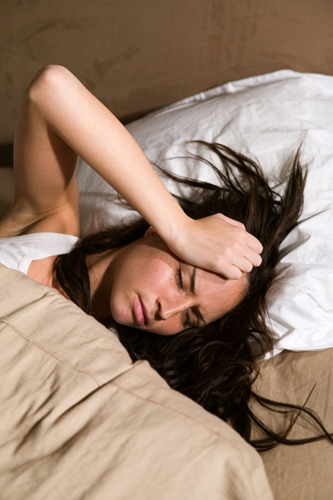| Q: |
What is a sleep disorder?
|
| A: |
A sleep disorder is an abnormality in the state or progression of
sleep. It disrupts sleep and can manifest itself in symptoms, such as
daytime sleepiness.
|
| Q: |
What are the different kinds of sleep disorders?
|
| A: |
Sleep disorders are either primary, when they are intrinsic to
the sleep process, or secondary, when the sleep disruption or
abnormality results from another disease in the mind or body. Primary
sleep disorders encompass the following: disorders that cause insomnia,
disorders of excessive daytime sleepiness, sleep-disordered breathing
(abnormal breathing rhythms in sleep), disorders of excessive movement
during sleep, disorders in the timing of sleep (as in jet lag), and
disorders resulting in abnormal events during the night, such as
sleepwalking.
|
| Q: |
What are the symptoms of a sleep disorder?
|
| A: |
The most common symptoms are inability to get to sleep or
maintain sleep (insomnia), excessive daytime sleepiness, nocturnal
awakenings, or abnormal movement, behavior, or sensations during sleep.
|
| Q: |
What is daytime sleepiness?
|
| A: |
This is a feeling of not being alert or as alert as one should be
during the day. It is important to distinguish between sleepiness and
physical fatigue, and to be clear in your mind how you really feel.
|
| Q: |
How do I know if I am excessively sleepy?
|
| A: |
You will know this yourself. For a more objective assessment,
medical professionals use various tools to gauge the level of subjective
and objective sleepiness. One such tool is the Epworth Sleepiness Scale.
|
Myth or truth?
Myth
“Sleep disorders are neither common, nor serious”
Truth
At any one
time, approximately 10 percent of the population suffers from a
clinically significant sleep disorder. In other words, 1 in 10 people
have a condition that requires a doctor’s advice or treatment. Sleep
disorders can result in accidents at work and while driving, thereby
raising significant public health issues. The most common sleep disorder
is insomnia, followed by sleep-disordered breathing, and restless legs
syndrome.

The Epworth Sleepiness Scale
The Epworth Sleepiness
Scale was first devised by Dr. Murray Johns in Australia and published
in 1991. It measures chronic sleepiness over time. It has been
extensively validated and translated into many languages, and is one of
the most widely used clinical questionnaires in the world today.
This scale asks how
likely are you to doze off or fall asleep in a number of situations, in
contrast to feeling just tired. It refers to your usual way of life in
recent times. Even if you haven’t been in some of these situations
recently, try to work out how they would have affected you. Use the
following scale to choose the most appropriate number for each
situation:
Add up your score, which could be a maximum of 24. A score of 11 and over is consistent with excessive daytime sleepiness.
0 = no chance of dozing
1 = slight chance of dozing
2 = moderate chance of dozing
3 = high chance of dozing

Table
| Situation | Chance of dozing |
|---|
| Sitting and reading | 0 1 2 3 |
| Watching television | 0 1 2 3 |
| Sitting inactive in a public place (like a theatre or a meeting) | 0 1 2 3 |
| As a passenger in a car for an hour without a break | 0 1 2 3 |
| Lying down to rest in the afternoon when circumstances permit | 0 1 2 3 |
| Sitting and talking to someone | 0 1 2 3 |
| Sitting quietly after a lunch without alcohol | 0 1 2 3 |
| In a car, while stopped for a few minutes in traffic | 0 1 2 3 |